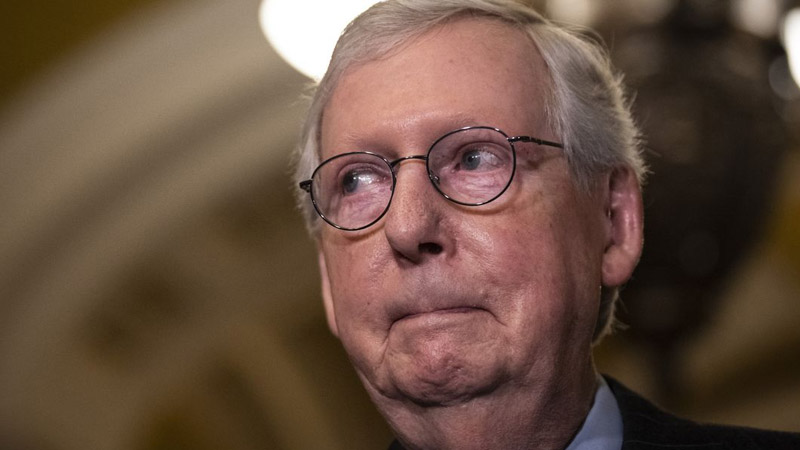On Tuesday, U.S. Senate Minority Leader Mitch McConnell (R-KY) openly criticized former Fox News host Tucker Carlson while discussing the recent approval of a $95.3 billion bipartisan foreign aid bill. A substantial portion of this bill, amounting to approximately $60 billion, is earmarked for assisting Ukraine in its ongoing conflict with Russia.
The critique of Carlson came after his interview earlier this year with Russian President Vladimir Putin, which has stirred considerable attention and controversy. Mitch McConnell pointed out that Tucker Carlson, with his significant influence and viewership, played a role in shaping Republican views on the aid to Ukraine.
According to McConnell, Carlson’s broadcast reached a wide audience, persuading many rank-and-file Republicans to doubt whether supporting Ukraine was the correct decision. This skepticism among party members was a contributing factor to the prolonged discussions and delays that surrounded the passage of the foreign aid legislation.
Axios notes, “It’s not the first time McConnell has publicly criticized Carlson, also blasting the anchor for his coverage of the January 6th riot at the capitol.” C-SPAN posted a video via X (formerly Twitter) of a press conference, in which the top Republican was asked, “You’ve been probably one of the most ardent backers of Ukraine in the Senate here, but what took so long to get some of these other eight Republicans persuaded to your position? Was it the overall nature of this bill and what was lost in that time period for Ukraine?” McConnell replied, “I think the demonization of Ukraine began by Tucker Carlson, who, in my opinion, ended up where he should have been all along, which is interviewing Vladimir Putin.”
In detailing the complex process that led to the eventual passage of the bill, McConnell explained that creating law necessitates bipartisan cooperation, which inherently includes negotiations with Democrats. Additionally, internal disagreements within his own party posed further hurdles. Some members felt the initial proposals were inadequate, while influences from a presidential nominee pushed for a halt on any legislative actions, further stalling progress.
McConnell described these negotiations as time-consuming, indicating that it took several months to address and reconcile the various concerns. McConnell also noted that the approved supplemental aid package, while it did not resolve every issue such as problems at the border, was successful in addressing immediate and growing threats.
This statement underscores the complex and multifaceted nature of legislative processes in U.S. politics, where not all objectives can be met, but progress is made through compromises and incremental steps. This public rebuke of Tucker Carlson by a leading Republican figure like McConnell highlights the ongoing debates within the party about how to best engage with global conflicts and the role of media personalities in influencing policy decisions.
It also reflects the broader challenges and dynamics that leaders face when navigating through internal party disagreements and external pressures to formulate policies that address urgent international issues. As the U.S. continues to play a significant role on the world stage, the decisions made in these legislative packages not only shape foreign relations but also reflect internal political alignments and priorities.



